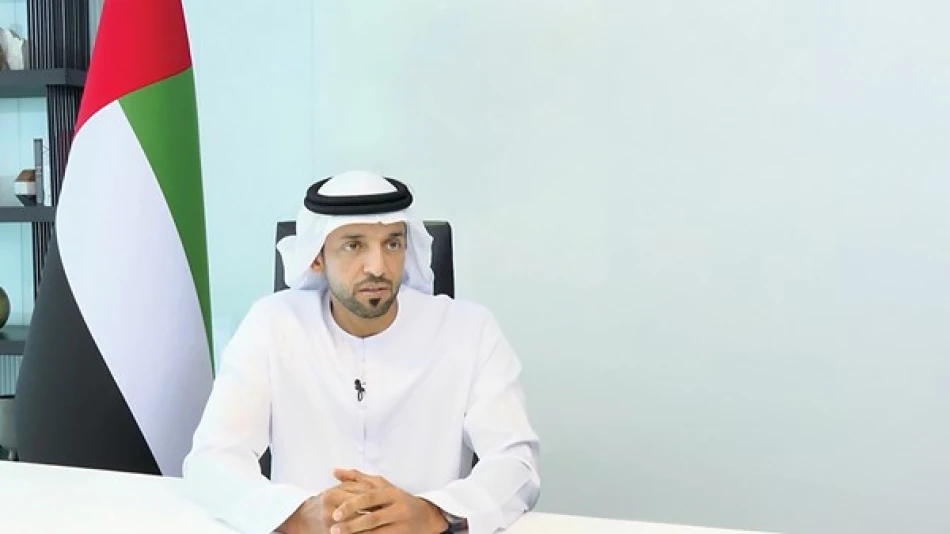
UAE Minister Unveils National Strategy to Empower Emirati Youth in Sustainable Development
UAE's Youth Empowerment Machine Hits 65% Milestone as Nation Doubles Down on Next-Generation Leadership
The UAE Federal Youth Authority has achieved a 65% completion rate on its first wave of strategic youth programs by mid-2025, marking a significant acceleration in the nation's ambitious plan to transform young Emiratis into decision-makers rather than passive recipients of policy. This progress reflects the UAE's calculated bet that youth empowerment will be critical to maintaining its competitive edge in an increasingly volatile global economy.
Beyond Traditional Youth Programs: Building Tomorrow's Power Brokers
Dr. Sultan bin Saif Al Neyadi, Minister of State for Youth Affairs, revealed that the Federal Youth Authority operates under the comprehensive "National Youth Agenda 2031" – a roadmap that positions young Emiratis as active partners in national development rather than future beneficiaries. The strategy encompasses five core pillars: economy, skills and education, community and values, role modeling, and quality of life.
What distinguishes this approach from typical youth initiatives is its emphasis on real decision-making power. The Authority has established 224 youth councils across local, ministerial, sectoral, and international levels, executing over 500 initiatives that have directly impacted more than 20,000 young people. These councils aren't ceremonial bodies – they actively contribute to policy formation across education, economics, environment, and community development.
Strategic Infrastructure for Economic Participation
Financial Literacy as National Security
The UAE's partnership between the Youth Authority, Ministry of Finance, Central Bank, and Securities and Commodities Authority to launch the Young Financial Advisors Program signals recognition that financial literacy among youth is a matter of national economic security. This initiative aims to create a generation capable of navigating increasingly complex global financial markets – crucial for a nation whose economy depends on international investment flows and diversification away from oil dependency.
Global Market Access Through "Youth Station"
The "Youth Station" program and the "Emirati Quarter" project at Dubai International Airport represent sophisticated approaches to youth entrepreneurship. Rather than limiting young entrepreneurs to domestic markets, these initiatives provide direct access to global commerce streams. Dubai International Airport, one of the world's busiest aviation hubs, offers young Emirati entrepreneurs exposure to international markets from day one – a significant advantage over traditional startup ecosystems.
International Influence Building: The UN Delegation Strategy
The UAE Young Delegates to the United Nations program demonstrates the nation's long-term thinking about soft power projection. By training young Emiratis to represent the country in international forums, the UAE is building a pipeline of globally-minded leaders who understand both local priorities and international dynamics. This approach mirrors similar strategies by Singapore and Switzerland, countries that have successfully leveraged small populations to achieve outsized global influence.
The Global Initiative for UAE Youth has facilitated participation of over 1,355 young people in approximately 147 international events since 2019, creating a network of internationally experienced Emiratis who can navigate global challenges while advancing national interests.
Corporate Partnership Model: Beyond Traditional Internships
The Authority's partnerships with major corporations like Emirates Group, Abu Dhabi Ports, and Emirates Global Aluminum represent a sophisticated approach to private-sector collaboration. Rather than standard internship programs, these partnerships focus on creating pathways to leadership positions within strategic industries.
The collaboration with the Museum of the Future particularly stands out, as it positions young Emiratis at the intersection of technology and policy – critical for a nation betting heavily on becoming a global innovation hub. This partnership model could serve as a template for other Gulf states seeking to diversify their economies while maintaining cultural identity.
National Service Integration: Military-to-Civilian Pipeline
The "Fakhr" initiative, developed in partnership with the National and Reserve Service Authority, addresses a challenge many countries face: effectively transitioning military personnel into civilian careers. By focusing on over 4,000 national service members, the program creates a structured pathway from military service to productive civilian roles, potentially reducing brain drain and maximizing return on national service investments.
Market Implications and Regional Competition
The UAE's comprehensive youth empowerment approach positions it favorably against regional competitors like Saudi Arabia's Vision 2030 and Qatar's National Vision 2030. While these initiatives share similar goals, the UAE's emphasis on immediate decision-making authority and international exposure could provide competitive advantages in attracting and retaining talent.
For investors and multinational corporations, the UAE's youth development infrastructure suggests a pipeline of locally-trained, internationally-aware talent that could reduce recruitment and training costs while providing cultural insights crucial for regional operations.
The 65% completion rate by mid-2025 indicates strong execution capabilities, suggesting that subsequent program phases are likely to meet their targets. This reliability in program delivery could influence international partnerships and investment decisions, as consistent policy implementation remains a key factor in long-term business planning in the region.
Most Viewed News

 Layla Al Mansoori
Layla Al Mansoori






